Perturabo: Hammer of Olympia Read online
THE HORUS HERESY®
The Primarchs
PERTURABO: HAMMER OF OLYMPIA
Guy Haley
MAGNUS THE RED: MASTER OF PROSPERO
Graham McNeill
LEMAN RUSS: THE GREAT WOLF
Chris Wraight
ROBOUTE GUILLIMAN: LORD OF ULTRAMAR
David Annandale
More Iron Warriors from Black Library
THE CRIMSON FIST
John French
ANGEL EXTERMINATUS
Graham McNeill
TALLARN: EXECUTIONER
John French
TALLARN: IRONCLAD
John French
THE EAGLE’S TALON / IRON CORPSES
John French and David Annandale (audio dramas)
IRON WARRIORS: THE OMNIBUS
Graham McNeill
THE SIEGE OF CASTELLAX
C L Werner
MALODRAX
Ben Counter
CONTENTS
Cover
Backlist
Title Page
The Horus Heresy
One
Two
Three
Four
Five
Six
Seven
Eight
Nine
Ten
Eleven
Twelve
Thirteen
Fourteen
Fifteen
Sixteen
About the Author
A Black Library Publication
eBook license
A BLACK LIBRARY PUBLICATION
First published in Great Britain in 2017
This eBook edition published in 2017 by Black Library, Games Workshop Ltd,
Willow Road, Nottingham, NG7 2WS, UK.
10 9 8 7 6 5 4 3 2 1
Produced by Games Workshop in Nottingham.
Cover illustration by Mikhail Savier.
Perturabo: Hammer of Olympia © Copyright Games Workshop Limited 2017. Perturabo: Hammer of Olympia, The Horus Heresy Primarchs, GW, Games Workshop, Black Library, The Horus Heresy, The Horus Heresy Eye logo, Space Marine, 40K, Warhammer, Warhammer 40,000, the ‘Aquila’ Double-headed Eagle logo, and all associated logos, illustrations, images, names, creatures, races, vehicles, locations, weapons, characters, and the distinctive likenesses thereof, are either ® or TM, and/or © Games Workshop Limited, variably registered around the world.
All Rights Reserved.
A CIP record for this book is available from the British Library.
ISBN 13: 978 1 78496 533 4
This is a work of fiction. All the characters and events portrayed in this book are fictional, and any resemblance to real people or incidents is purely coincidental.
See Black Library on the internet at
blacklibrary.com
Find out more about Games Workshop’s world of Warhammer and the Warhammer 40,000 universe at
games-workshop.com
THE HORUS HERESY
It is a time of legend.
Mighty heroes battle for the right to rule the galaxy. The vast armies of the Emperor of Mankind conquer the stars in a Great Crusade – the myriad alien races are to be smashed by his elite warriors and wiped from the face of history.
The dawn of a new age of supremacy for humanity beckons. Gleaming citadels of marble and gold celebrate the many victories of the Emperor, as system after system is brought back under his control. Triumphs are raised on a million worlds to record the epic deeds of his most powerful champions.
First and foremost amongst these are the primarchs, superhuman beings who have led the Space Marine Legions in campaign after campaign. They are unstoppable and magnificent, the pinnacle of the Emperor’s genetic experimentation, while the Space Marines themselves are the mightiest human warriors the galaxy has ever known, each capable of besting a hundred normal men or more in combat.
Many are the tales told of these legendary beings. From the halls of the Imperial Palace on Terra to the outermost reaches of Ultima Segmentum, their deeds are known to be shaping the very future of the galaxy. But can such souls remain free of doubt and corruption forever? Or will the temptation of greater power prove too much for even the most loyal sons of the Emperor?
The seeds of heresy have already been sown, and the start of the greatest war in the history of mankind is but a few years away…
ONE
THE TYRANT OF LOCHOS
799.M30
LOCHOS, OLYMPIA
The last of the rain cleared away. Fresh moisture was drunk eagerly by the thirsty earth, turning it dark. In the morning the ground would return to its sandy hue, but until then, the sharp scent of rain on arid ground hung about the mountains.
Through the cool last watch of the night, along a drying path of hard-packed earth, the boy Perturabo was taken to Lochos.
Four men in white-and-gold armour escorted him, two before and two behind. If the boy had lacked anything but the greatest confidence, he would have seen himself as their prisoner. That was the warriors’ purpose, to be his guards, but they doubted it themselves now that they had found him. When Perturabo spoke, they listened keenly, as if his words compelled them to hearken. All of them saw the sham of guard and guarded for what it was.
The boy was called Perturabo at his own insistence. The leader of the men was named Miltiades. His coloured helm crest proclaimed him Sub-Optio in the 97th Grand Company of Lochos, a man of authority among his people The other men did not offer their names, and so the boy did not know them. Boy, man - these terms were purely subjective. Perturabo looked like a boy, and so it was reasonable to assume he was a youth. He was not. There was an unearthly air to him. He moved and spoke like a man used to high office. They kept up the pretence that they were men and he was a boy, and therefore they were in command, but none of them believed that either. Perturabo’s manner suggested that he was better than them, superior in every way, and they accepted it meekly.
Low cloud became mist that writhed down the cliffs into the valleys, uncloaking diamond stars. The star maelstrom glowered with imminent menace at the centre of the sky. Though the men had said they could not see it, Perturabo was aware of its malevolent gaze at all times. Not wishing to feel fear, he ignored it and focused his attentions on the world beneath his bare feet.
The road was rough, studded with rock polished smooth by the feet of generations of animal herders. Thorny plants lining its edges scraped at the boy’s legs. He examined them cursorily as he passed, curious about them even though he already knew their fundamental essences intimately. He breathed deeply, thrilling at the rain smell even as he formulated hypotheses as to where the rain had come from, and why it affected the world the way it did. Everything was new, and everything familiar. Knowledge came into his mind without active recollection. It was simply a part of him. He was a newborn burdened with wisdom beyond his years.
Lochos rose immense and massy on a horizon foreshortened by bladed mountains, yet made distant by the valley between the party and the city’s bronze gates, dull in the dark. Its golden domes hunkered down behind towering walls and bastions, like the helmets of men sheltering from their enemy. Weapon barrels protruded from its many embrasures. It was a place of strength with pretensions to beauty that it could not quite carry off; its warlike nature was too pronounced for that.
The boy and his party crested a steep ridge in silence. The world had the preternatural hush of the dying night. Their feet scuffed the path and their battlegear jingled too loudly in the quiet. A dry, tussocky stretch of sharp montane plants sloped away, the spaces between the scrubby grasses and gorse broken by rocks sharp as teeth. The ground was poor, but boundaries of the same stone, expertly fitted together,
divided the upland into fields nonetheless. Man’s habit of jealously separating his possessions from those of his neighbour was strong even here, though the land in question was barely worth definition.
The walls ran right to the point where the ground came to a precipitate finish and the valley plunged deep. The grey light of predawn blurred everything together. Although the valley was still invested by night, the boy had superb vision, and on the far side he saw terraced fields and forests of coniferous trees and towering, thorny succulents.
Out of sight, animals bleated. The road turned to follow one of the dry stone walls. The path brought them to the brink of cliffs where the valley yawned wide and deep. Village lamps gleamed in the depths, their light reflecting from tumbling brooks and the flat waters of stepped reservoirs. The damp, rich aroma of quickening plant life filled the valley brim to brim. The road went over the edge, down steps carved into the side of the rock, carrying Perturabo from the dry air of the high mountain to the forest-moist atmosphere of the valley in a few paces. The guards fell into single file, Miltiades in front of Perturabo, the rest after.
Lochos dominated this fertile slash in the unforgiving land. Perturabo’s memory was a blank, devoid of meaningful content, but he understood what he saw as if he had direct experience of it. He apprehended the geological processes that had created the valley.
He appreciated the reason for Lochos’ situation, what it was meant to protect, and why people would wish to protect such a place at all.
Miltiades paused at a short landing in the stone-cut stair. Holding out his hand, he broke his silence. ‘This part is treacherous.’
‘I require no help,’ said Perturabo, staring at the sub-optio’s hand with the same kind of mild curiosity with which he regarded everything.
‘Suit yourself,’ said Miltiades. He turned away, failing to hide his unease at the uncanny youth.
The steps were worn and slippery with algae fed by water seeping out of the rock. Perturabo negotiated the section easily. From there it was a short descent to a wider, paved road. The outer edge was bounded by the precipitous slopes of the valley, and marked by a low, mortared wall. The men took up their positions around the boy, four corners to a square.
‘Is this the road to Lochos?’ the boy asked.
The road curved out of sight around a high bluff topped with wrinkled crags. The ground was dark with water yet to be absorbed, though not wet enough to turn the road surface to mud. Rising temperatures made the place uncomfortably muggy, but the change did not affect the boy at all. Temperature was a variable to be noted, appraised and remembered for later examination, nothing more.
‘This is the road to Irex,’ said Miltiades. ‘It joins the highway to Lochos below us. We must go further down to get there.’
They descended at a brisk march. The light in the sky turned from grey to a pale gold, and the overwhelmed stars withdrew.
Even the star maelstrom faded to a livid bruise. The boy was glad of it. With the coming of the sun, the maelstrom’s power to see him was lessened, and a part of himself relaxed - a part that he had not been aware of before.
Night clung on in the valley, and the deeper they went the darker it became The air thickened with the shadows, as if the darkness were gathering there for a last stand in defiance of the strengthening day.
Colour seeped into the world. From the villages and farmsteads clinging to the slopes of the valley, the sounds of waking families emanated, carrying far in the rarefied air. The houses were built in precarious places, atop rocks and crags. By observing this, along with the elaborate terracing and soil traps that filled the hills, Perturabo measured the importance the inhabitants attached to every inch of arable ground.
The road fed into the highway. Close-fitted stone made a smooth surface, along which plodded occasional carts drawn by draft beasts.
It was still quiet, and the party made good progress down the valley. The road met a white river and went onto a dyke beside it made from rocks carefully fitted into the spaces between flood-dumped boulders. A short while later, the road crossed the river via a broad bridge. On the far side it immediately began to switch back up a steep rise that quickly became a sheer cliff, unmarked by man’s hand save for the laboriously cut loops of the road.
The walls of Lochos grew from the mountaintop. They were fashioned from slabs of sandstone so closely fitted that the walls made a seamless whole, indivisible from the rock they were built upon. But although they grew from the peak and were of the same material, the walls were as different to the mountain as the boy was to the men. In art and majesty, the walls exceeded the mountain. They surrounded the peak, conquering it - the artifice of man surpassed that of nature. The boy and the fortress were the same in that regard.
Miltiades looked back to the boy, pride evident in his voice. ‘The walls of Lochos,’ he said. ‘Unbreachable and unbroken.’
‘Nothing lasts forever,’ said Perturabo.
Miltiades scowled.
The road went back and forth in precise zigzags. A central channel took water and provided a track for the braking poles of waggons. The road steepened, and ridges of precisely shaped setts broke the surface to provide traction. Small bastions guarded every switch near the top.
A semicircular plaza carved directly from the rock fronted the great gatehouse. The gates were thick wood sheeted with bronze and faced with hard spikes of iron. Two giant towers guarded them.
Miltiades stopped in front of the gates and rapped upon a tiny postern set into the rear of the left-hand tower. It had been placed at an angle awkward for rams, and when it opened it revealed a narrow stair guarded by an iron yett. Perturabo saw a weakness there.
‘Back so soon, sub-optio?’ said the guard. He wore a uniform that differed to Miltiades’ garb and spoke to him insolently. His face changed when Miltiades stepped back and held out his arm to indicate Perturabo.
‘Inform the palace,’ said Miltiades. ‘We have the boy.’
So Perturabo first came to Lochos, stealing in through a secret way.
The city was still waking as they marched up its steep, winding streets. Night workers and those whose trade forced early rising went to and fro.
Perturabo had never seen so many people - at least, as far as he knew. He had found himself upon a cliff. He had climbed it. He had met Miltiades and his men. That was the sum total of life experience Perturabo could recall. The city might hold far more.
It did hold far more. There was a pregnant air over its buildings, the sense of thousands of dreamers returning to the waking world. It fascinated him.
The city stepped up the mountain in tiers, with the palace filling the levelled peak, but the walls were truly monumental, rising higher than the lowest three levels and casting them into shadow while the sun warmed the stone outside.
Perturabo and his escort went along the main way, passing tight streets between small-windowed tenements. Every so often market squares opened up, full of traders chatting as they set out their wares. At regular intervals there were giant cisterns crowded by servants bearing water pots on their heads, while near the top levels rose huge temples and other edifices roofed with gleaming bronze.
The palace outshone them all. A huge plaza surrounded its walls, and three domes crowned its towers. The gates were decorated with glorious reliefs in gold and silver. A glance at the windows, and their ratios of construction, the load upon them and the mathematics needed to calculate both and more were Perturabo’s to command. There was so much to see that he had never seen before, but much was familiar. He knew it all: the materials, their properties and the effects the architect had intended to instill.
Perturabo looked upon everything and was at once amazed and jaded. His delight at each new observation faded as the knowledge sprang into his mind, leaving him feeling cheated of the joy of discovery. Even so, the palace impressed him by the way it dominated the city. It looked out over the roofs and the wall to the plunging view beyond. On the far side of the fer
tile lands, he saw the scrubby upland he had gained at the end of his climb. Beyond that was a wide void, blue with pollen, smoke and dissipating mists. Far away on the other side, more mountains rose. In every direction there were mountains stained orange by the young day, their flanks stepped with ancient quarries, their pinnacles crowned with forts.
Miltiades drew Perturabo’s attention back to the palace.
The great gates of silver and gold groaned wide, and the palace opened itself to him.
The tyrant was awake and ready. He had been expecting the youth.
Ranks of gold-and-white armoured men lined the marble hall, filling the gaps between its tall columns. Their faces were stern in their open helmets. Flambeaux competed with weak electrical illumination, but they were all being overwhelmed by the light of the sun.
Two titanic statues stood either side of a huge throne, their right hands held out in natural, lifelike poses. The totems they clasped in their left fists, and the robes that adorned their heroically muscled bodies, were rendered in iron.
Upon the throne between these two huge figures, the tyrant sat. He was small and middle-aged, a crown of stylised iron pine needles on his head. A pair of golden sceptres nestled casually in the crooks of his arms; here was a man who wielded his power with seeming carelessness.
At first glance, the tyrant was not an imposing sight, being spare-limbed with the hump of a round stomach clearly visible under his chiton of imperial purple. His black hair was sparse, and the style he wore it in, brushed up to feather his scalp, only accentuated its lack. His nose was prominent, and his eyes close set. Indeed, he seemed to have been poorly fated, for the men he surrounded himself with were lithe and clean-limbed and handsome of face, while the patricians gathered in a crowd before his throne were taller and more richly dressed than him.
But his courtiers seemed pompous in comparison, like peacocks around a hawk, and though his throne was scaled monumentally and should have engulfed him, somehow the many tonnes of masonry around the tyrant served to aggrandise the little man rather than diminish him. The statues to his left and right were superficially more impressive than him, but they were ridiculous in their size. There was no power in their pupil-less eyes. They were blind, and stone dead.

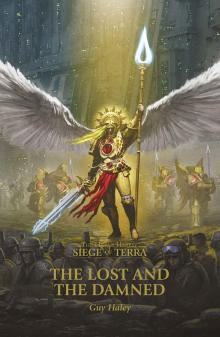 The Lost and the Damned (The Horus Heresy Siege of Terra Book 2)
The Lost and the Damned (The Horus Heresy Siege of Terra Book 2)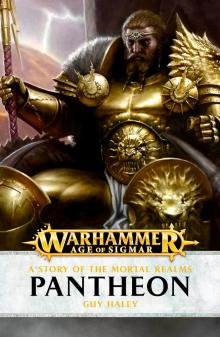 Pantheon
Pantheon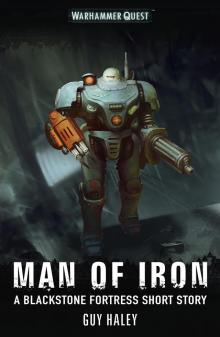 Man of Iron
Man of Iron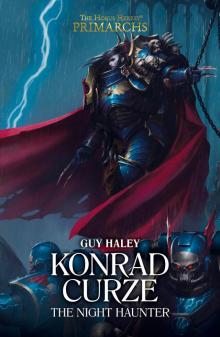 Konrad Curze the Night Haunter
Konrad Curze the Night Haunter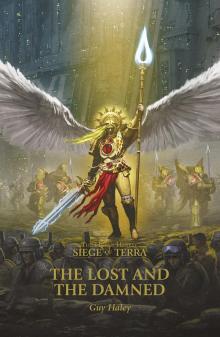 The Lost and the Damned
The Lost and the Damned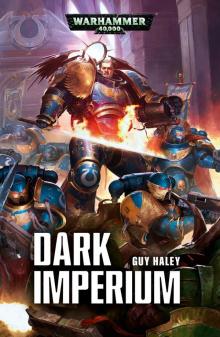 Dark Imperium
Dark Imperium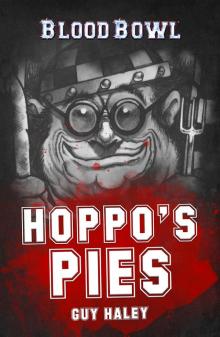 Hoppo's Pies
Hoppo's Pies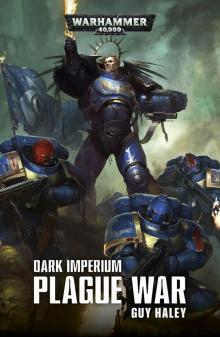 Dark Imperium: Plague War
Dark Imperium: Plague War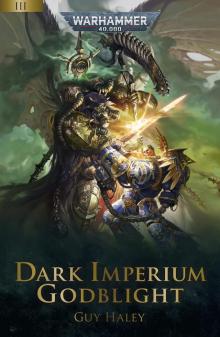 Dark Imperium: Godblight
Dark Imperium: Godblight Crash
Crash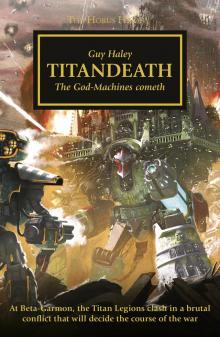 Titandeath
Titandeath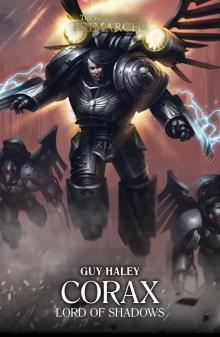 Corax- Lord of Shadows
Corax- Lord of Shadows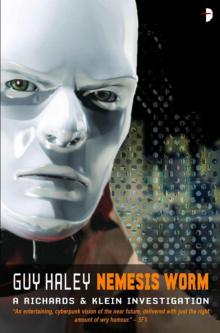 The Nemesis Worm
The Nemesis Worm Wolfsbane
Wolfsbane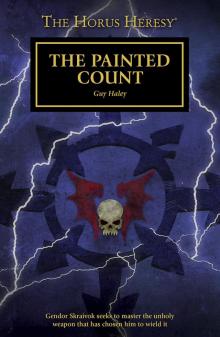 The Painted Count
The Painted Count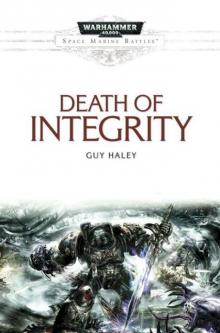 The Death of Integrity
The Death of Integrity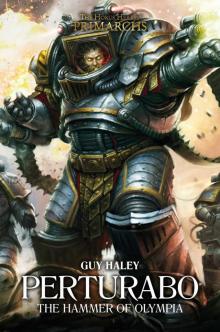 Perturabo: Hammer of Olympia
Perturabo: Hammer of Olympia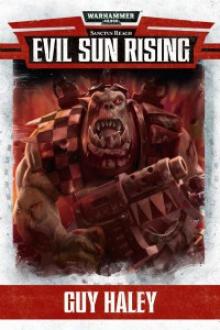 Evil Sun Rising
Evil Sun Rising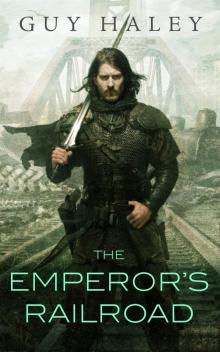 The Emperor's Railroad
The Emperor's Railroad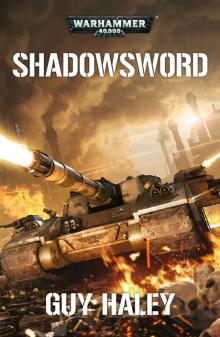 Shadowsword
Shadowsword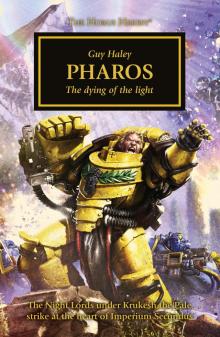 Pharos
Pharos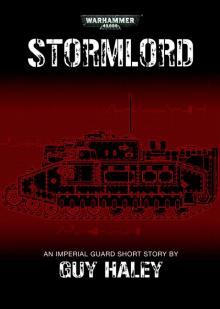 Stormlord
Stormlord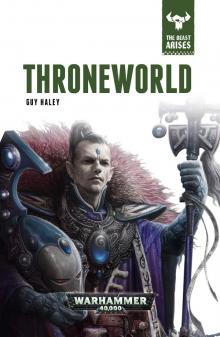 Throneworld
Throneworld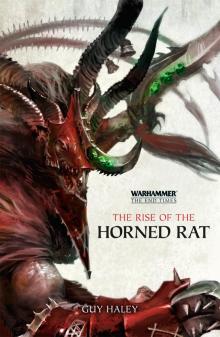 The End Times | The Rise of the Horned Rat
The End Times | The Rise of the Horned Rat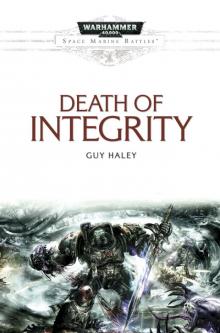 Death of Integrity
Death of Integrity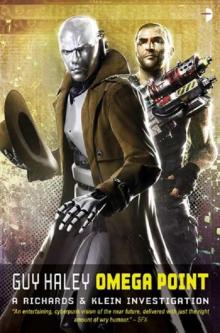 Omega Point
Omega Point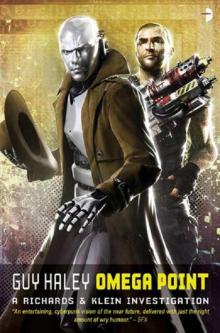 Omega point rak-2
Omega point rak-2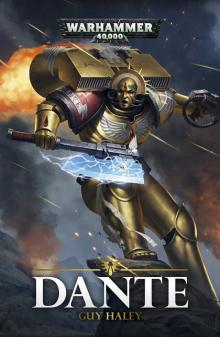 Dante
Dante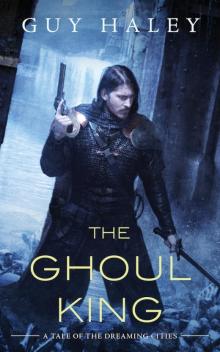 The Ghoul King
The Ghoul King The Devastation of Baal
The Devastation of Baal Reality 36: A Richards & Klein Novel
Reality 36: A Richards & Klein Novel The Rite of Holos
The Rite of Holos Champion of Mars
Champion of Mars Crusaders of Dorn
Crusaders of Dorn Baneblade
Baneblade